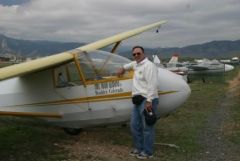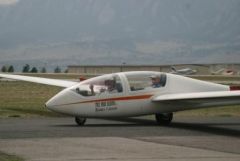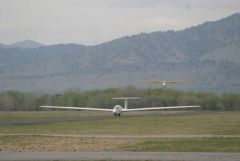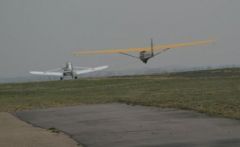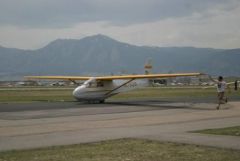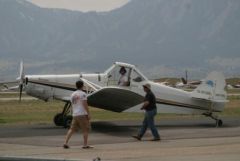-
Content Count
2713 -
Joined
-
Last visited
-
Days Won
44
Content Type
Profiles
Forums
Blogs
Gallery
Everything posted by tbutler
-
From the album: Flying Gliders at Mile High Gliders, Boulder, CO
I have now completed my solo requirement, ten flights on my own. Now I have an oral exam and a series of flights with an FAA certified examiner to become a glider pilot!© @ Tom Butler
-
We have our inverter on all the time. When we pack up and leave a park, we bring in slides and then unplug. The inverter picks up from there. How long it lasts depends on what load you put on the inverter. A laptop is a small load. I monitor our usage during our travels and we run 6 to 9 amps base load and have a 440 amp hour (4 ea 6V batteries) to run the inverter. We also have a roof-mounted solar panel, but even on cloudy days we have no problem using the inverter all day long. It will run all day and run the TV for several hours at night before we have to use the generator or be plugged in. When we plug in, the inverter will recharge the batteries and we're back in business. So the question comes down to what is your base load and what is your battery source to run the inverter? If you don't have an easy way to answer these questions, just try it on a day when you expect to be plugged in at night. Unless you have a small battery supply or a very large base load, I'm guessing it will work fine for you. Base load is the stuff you can't turn off, the electronic controls on the refrigerator and the various safety devices (smoke detector(s), CO detector, LP detector), indicator lights on switches, other sensors, etc. Part of our base load (with the inverter on) is our alarm clocks, the microwave clock, probably a few other things I can't think of now. I was recently at Camping World and mentioned something about an inverter to another motor home owner with a very nice motor home and they said they never used their inverter and I was amazed. I just wouldn't imagine not using such a useful device. We run battery chargers for our phones on the inverter if needed while traveling, stop and turn on the computer or the TV to check weather, catch up on the news on TV while eating lunch, our AC current is always on! We recently upgraded to a true sine wave inverter with automatic generator start (our old one had auto gen start but it quit working) so basically when the inverter runs the batteries down it kicks on the generator and we don't have to worry about the batteries getting run down even when we are boondocking.
-
WHOA DUDE! An Excel spreadsheet! Now that is organized! Just kidding, everyone finds their own level of planning. For me personally, I feel out of sorts when I know that I have to be someplace in the next five days. I hate having to make appointments more than a month ahead. Our plans are always tentative but then we never have to pack or unpack the RV and don't have to work. Sorry about the four letter word! Full timing is about as free as we can be! When backpackers pack long trips along the Sierra Nevada they can ship supplies to way points along their route. You might try that with the Blue Bell Ice Cream! If we were going to be in Colorado when you come through, I'd give you an address to ship the ice cream to... We keep criss-crossing the country and haven't seen near everything, not even everything we are interested in seeing. We try to make every trip via a different route. Enjoy your trip!
-
Wayne, Then next launch after the 11th of May is May 20 if you believe NASA can get two shuttles off on that short a schedule. Personally I'm skeptical about that but they posted the schedule that way. If you want a full listing of the coming rocket and shuttle launches, go to http://www.nasa.gov/missions/highlights/schedule.html They update launch dates as delays change schedules so check frequently if you are planning to go for a launch. The next two after the May 20 date are June 13 and August 6. The Shuttle program is winding down so if you haven't seen a launch yet, get to one soon.
-
Intuitive... that's what you call it if you have written the code. It all looks so simple! We users have another name for it until we have used it for a few months and then it becomes intuitive to us as well! Enjoy your trip and I'll be looking for your Blog!
-
From the album: Flying Gliders at Mile High Gliders, Boulder, CO
A good flight ends with a smile!© @ Tom Butler
-
From the album: Flying Gliders at Mile High Gliders, Boulder, CO
In the foreground the modern glider rolls to a stop while the glider used for instruction nears touchdown on a runway just to the south.© @ Tom Butler
-
From the album: Flying Gliders at Mile High Gliders, Boulder, CO
This modern glider sails almost silently overhead as it prepares to land.© @ Tom Butler
-
From the album: Flying Gliders at Mile High Gliders, Boulder, CO
The tow plane lifts off shortly after the glider. Both fly to altitude together. When the pilot of the glider is ready to separate, a pull of a knob releases the rope holding the two planes together and the glider is free to soar.© @ Tom Butler
-
From the album: Flying Gliders at Mile High Gliders, Boulder, CO
With an assistant holding up a wing, the tow plane pulls it down the runway. It isn't long before the wing man can't keep up.© @ Tom Butler
-
From the album: Flying Gliders at Mile High Gliders, Boulder, CO
This tow plane will be hooked up to the glider as soon as the pilot is ready.© @ Tom Butler
-
Doug, When you are logged in, go to the community page and look at the top of the page. There is a line that has My Controls, View New Posts, etc. I think that you can go to My Controls and look at the left side of the page for the menus. There should be one that says My Blog. Mine won't give me a choice to start a Blog but I think that is because I already have one. If you click on the Blog menu item it should come up with a page for creating a blog. Name it, put your names as desired on it and start with your first entry. There may also be an entry on the community page next to My Controls that says My Blog. Clicking that entry may bring up the start a Blog page. If neither of these suggestions work, just start probing around on the My Controls page and you should find it somewhere. It can't be too difficult, I found it!
-
Hey Wayne, Ouch! Diesel at the Flying J at Quincy, I-10 Exit 192 was $2.279 (I checked the internet just now). When I get caught in this situation I'll put in enough fuel to get me 100 miles down the road rather than filling up at the higher price. Next time you are in the Flying J, pick up a brochure that gives the location of all their stations nationwide. My navigator keeps it in her map pocket. We also have The Next Exit which will give you a full listing of restaurants, shopping and fuel stations at every exit on the entire Interstate Highway System. And there is the GPS as well. All good resources for finding what you need. At 22 cents a gallon you could have bought the book and had change to spare... Sounds like a great campsite. Enjoy your stay. If your schedule is flexible, the Space Shuttle is scheduled to launch on May 11 with a second launch scheduled for May 20! I am hoping to see at least one if not two. We'll be headed to Florida soon.
-

Trip journal, what is best method?
tbutler replied to DougC's topic in RV Internet to Go/Staying in Touch
I second the suggested blog! You could share your adventure with us as you travel. We in turn could comment on things like: If your going there you should see... or, I didn't know there was one of those there... You might think that those of us who travel full time wouldn't be interested in your travels but each of us has our own unique interests and we pursue different interests when we travel. Your blog will help widen our world by seeing it through your eyes. When we started traveling full time almost eight years ago now I started sending a weekly e-mail to our children and mothers. My son printed out each one and kept it for his children, just 2 and 1 years old at the time. I didn't think to do that so when I changed computers or cleared old e-mails I lost all those records of our travels. I wish I had them on the computer now. At least we have the printed information. Like Gary says, enhance your journal with any special talents and interests. Perhaps you'll end up with a book or movie! -
Joel, Several other entries in the Motorhome: Buying a motorhome forum deal with extended warranties, and there are good ongoing discussions about each of them: RV Warranty insurance Extended warranty, which company is best? Extended Service Plan - What do you suggest? I don't know of a site that compares the various companies' plans. I know that there are several major plans available but have encountered some small more product/dealer oriented programs as well. If there is a site out there for comparing the programs I'll bet someone knows about it.
-

When life gives you lemons, make lemonade!
tbutler posted a blog entry in Tom and Louise on Tour in North America
We were into our second week in Denver last week. Louise was busy taking care of her mother and while I could help some, Mom was getting better and mostly needed supervision. Louise needed a nightly debriefing. So being the restless sort, I thought ... "I have always wanted to add a glider certification to my pilots license. Here I am in one of the glider meccas of the U.S. for an extended period of time. I wonder what opportunities there are?" A quick check on the WWWeb brought me to Mile High Gliders in Boulder, CO. I called and talked to the owner, Dave. He set me up for an interview with an instructor the following day. On Wednesday, I met Sean, late 20s, learned gliders in Hawaii and looked the part! Sean did a short interview, took me out and introduced me to their instructional gliders. We pre-flighted one, climbed in and went flying. I had the controls for a bit during the first flight and then we landed. These teaching sessions will be short; we don't go far from the airport and then return. After landing we hooked up to the tow plane again and were airborne in short order. This time I got more stick time, some practice following the tow plane (not as simple as it looks), turns, stalls and flying the landing pattern but Sean did the landing. We parked the glider after two flights because the wind was picking up. While you can fly gliders in winds, they weren't suitable for the practice that I needed to do. Thursday the weather was not suitable, for flying either. I spent a few hours at the airport after dropping off our motor home at Camping World. We are getting a new inverter/charger installed, so I turned our home over to the experts at Camping World in Wheat Ridge, CO. They had told us we could stay in the motor home Thursday night. A call from them Thursday confirmed that, so I made it a point to arrive before closing time. When I arrived I found we had no 12V current in the motor home. That meant no heat, no water. Even the refrigerator wouldn't work without the 12V for the controls. I caught two workers in the shop and prevailed upon them to help. Since they couldn't find the problem, they hooked up a 12V battery to the refrigerator to keep it running. We stayed the night with Louise's sister. Friday I spent the morning at Camping World. I worked with a crew of four to five techs who were buzzing around the motor home like bees at a hive. They tested everything and talked back and forth, seeking the source of the problem. They thought the 12 V was working when they left the unit Thursday night. Eventually, after much searching, the "a-ha moment" occurred. Dan said if they couldn't find the problem with the power, perhaps the ground was the problem. Viola. Connect the ground on the inverter and everything works again! I don't understand it, and that is why I have these guys working on it. I thought the DC was grounded to the frame of the motor home and they were testing the power at various points against the frame. They got nothing until connecting the ground at the inverter! At that point I was off to the airport. Friday was a good day to fly and I was able to fly six times. The first flight I took over the stick at 500 feet above ground and with each flight I was doing more of the flying. I made all six landings. The second flight we were 200 feet above ground when I got the stick. From there on, I was doing take-offs and landings. By Friday afternoon, I was walking on air. What a great experience. Before leaving the airport , I signed on for their intense five-day program, which should get me the glider certification on my pilots certificate. This was possible because I already had a pilots license and lots of experience in the air. I had been practicing many of the skills needed already. Now all I had to learn was to deal with the silence of flying in a glider, right? Not really, it is more complicated than that. Basically, I have to learn all the things that are unique about flying a glider. If I didn't have the pilots license it would have taken at least twice as long to get to the glider certification. Upon returning to Camping World to pick up the motor home, we found it parked heading out the driveway, a good sign. We paid the bill, picked up the keys and then went back to our parking spot at The Prospect RV Park. Everything seems to be working fine so far. I reloaded the compartment with access to the inverter, and when I closed the compartment door, I found water dripping from the refrigerator access door outside. Removing the access panel, I was greeted with a fine mist of water coming from the ice maker connecting hose. I knew this problem, because I had replaced one about two years ago. So I shut off the water at the valve immediately before the faulty hose and turned off the ice maker. Saturday I took Louise to the airport in Boulder to see the operation and perhaps watch me fly. It was not to be -- the weather was low clouds and flying, while possible, would be just up and down without any chance to practice other maneuvers. I worked several hours with John, a physics professor, on some of the book work required. We returned to Denver and enjoyed some family time with Louise's two sisters and her mother. We did some shopping. Louise needed some new walking shoes and my Nikes were wearing thin on the soles, so off to the mall for shoes. On the way home I stopped at Lowe's and picked up a replacement hose for the ice maker. I couldn't find the connections for the clear plastic hose that was originally installed and which I had replaced several years ago. I bought a stainless-steel reinforced hose with fittings for under three dollars. The one-foot hose fit fine and now perhaps I won't have to replace that part again. The water is back on and the ice maker works! Time for a drink! Sunday we woke to sunshine. I was off to the airport and spent the day there from 9 a.m. until about 4 p.m. I worked on my pre-solo written exam in between flights. John took over my flight instruction today and gave me a good workout with three flights in the morning. After a break in midday, we returned to flying in the afternoon. The winds had now picked up and the flying was more difficult. The fact that I was flying in these conditions meant that they were confident in my ability to cope with the challenge and still learn. Three more flights in the afternoon and I was finished for the day. I turned in my pre-solo exam to John and left hoping that I would see the solo on Monday. The forecast for Monday is once again low clouds and rain. Tuesday looks better. If all goes well, I'll be able to take my FAA check ride by Thursday or Friday. We are hoping to leave Denver on Saturday, May 2. I'd love to have a new pilots license in my pocket. I have almost half of the flights I paid for under my belt and the forecast suggests at least four of the next five days will be good for flying. I think I'll make it! -

Simple fix for dry washer drain stops odor problems
tbutler replied to tbutler's topic in Modifications
Thank you Wayne! So many good ideas out there. Both these are excellent solutions for keeping drains sealed. -
Mikemopar, I don't have experience with the 300 Cummins but did have an 8.3 liter Cummins, 1994 vintage. That engine as our current Cummins 400 was coupled with an Allison 6 speed automatic transmission. The 8.3 liter Cummins was pulling a little over 15 tons plus a toad of almost 6000 pounds. Our experience was that you could expect the engine to pull down on a 6% grade to a speed of 30 to 35 in third gear on a long 6% grade with that load. I don't know what your total GVW (Gross Vehicle Weight) will be but that might give you something to compare with. Today our Cummins 400 ISL does about the same with our 16 ton motor home and the same toad. I don't consider that to be too bad a problem. With any large vehicle and the characteristics of the diesel engine, you will get about the same. I am usually able to pass the loaded trucks easily on such grades without straining the engine. More important, I have never encountered a grade that we couldn't climb with either engine. Compare your weights to our vehicles and perhaps that will help you decide the capability of the engine/motor home you decide to finally purchase. Remember that a motor home is not a car and you will not find one that will perform or drive like a car. Travel in a motor home can be very relaxing if you go with the flow rather than trying to always get somewhere fast. Enjoy your journey!
-
Thanks Gramps! This is great news. To be followed we hope with better news. Glad to see this article.
-

Travel routes for 65-foot combo
tbutler replied to james_anderson@cox.net's question in Destinations/Attractions
I recently picked up a Rand McNally Deluxe Motor Carriers' Road Atlas at Flying J for less than $30.00. Among the benefits are highlighted truck routes. For these truck routes it also gives all low clearance locations in each state. We have used a previous edition for four years and decided it was time to get the latest information. Yes there are length restrictions for almost every state and they vary widely. Tow laws are also a part of this publication. The pages of the atlas are laminated and they do last for years of heavy use. It includes all of Canada and Mexico. Our rig is 40 (Windsor) + 20 (Trailblazer) + 5 (BikeE bicycles) = 65. I don't always use the truck routes, there are some great back roads and I will sometimes brave them. We have traveled in all 50 states and all of Canada with the exception of Quebec, Newfoundland/Labrador and Nunavut. I have been stopped by low clearance once when I wasn't anticipating it, railroad underpass in Pennsylvania. I don't use it but there is a big rig campground directory available. You might check it out on the internet (www.big-rigs-rv.com/) and/or at an RV dealer. We go to all kinds of campgrounds but don't have the trailer. We tow the Trailblazer on a tow bar and it can be unhooked in a few minutes. The above mentioned Trailer Life Campground Directory has a pretty reliable listing of the typical size of campsites including length. Call ahead and specify the length of your rig and the campground host/owners should be able to tell you if they can give you a site to accommodate your rig. We always do this when we want to be able to park without having to unhook. Owners are usually eager to fit you in if they can. You have some ambitious plans, enjoy the trip! -
Nope! Just your run of the mill science teacher!
-

Locked in motorhome
tbutler commented on dorothyscott1@bellsouth.net's blog entry in dorothyscott's Blog
Of course it would have to be raining when this happened. The cats sure knew what they were doing didn't they? We started carrying a spare key in the toad for just such an emergency! Imagine the fun if the cats (or dogs or grandkids) had jumped on the parking brake release. I keep a collar under the parking brake release so that it can't be depressed by accident. I also chock the wheels every time we stop! Trust but verify! -

Locked in motorhome
tbutler commented on dorothyscott1@bellsouth.net's blog entry in dorothyscott's Blog
I'd love to hear more about this... How do you get locked in so you can't get out? Was it a malfunction of the door lock? How did they finally resolve the problem? This could be helpful information in case we have friends with the same problem!!! -
Several thoughts on your problem. First, I have tried a number of tank additives and we are currently using the odor control from 5 Star Happy Camper, http://www.5starhappycamper.com/index.html Over the last four years we have found their product economical and effective. We have tried several others but always go back to this product. Purchased in bulk it doesn't take up too much space for a year's supply. We pack a 6 month supply in two 40 oz. containers which are about the size of two TP rolls. We then order the 130 oz. size and refill the smaller containers as needed. The large container is stored at "home" which for us is my daughters home. No product will make the black water smell good but this product is very effective in our experience and it is friendly for septic systems. I agree that you must have some kind of leak in the venting system or the tank. The fact that this occurs only when the tank is 3/4 full or more suggests that the vent pipe extends into the black water tank a distance of about equal to the top 1/4 of the tank. Once the level of the liquid reaches that level, the vent pipe will be blocked off. Resulting odors will find their way out through any weak spot in the system. This would be around the vent pipe, perhaps a bad seal on the vent pipe entry into the tank or a crack in the top of the tank. Such an escape route would be near ground level and would explain why you would smell the odor as you sit outside your coach. Hope this helps.
-
Gary, I should have mentioned the Flying J provision to get cash price at truck pumps requires the Flying J Credit Card. I got mine last fall when they changed to this method. Yes, you are right, the 5% discount beats the cash discount price. I usually am patient enough to use the RV pumps if they aren't too convoluted to get into. I too find them to be a challenge sometimes with our rig, also about 65 feet. Getting the cash discount plus the 5% cash back beats it all! I tend to avoid the truck pumps because of the amount of spilled diesel and the difference in the cash price provisions. But when necessary, I do use them.


